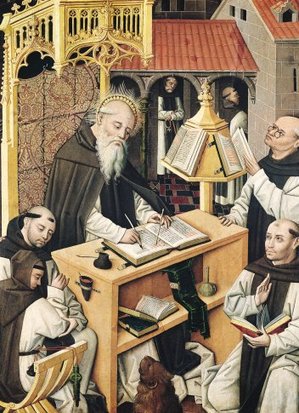Deus, in adjutorium meum intende

The Divine Office
I am eager to address a number of questions that readers have raised about the Divine Office but, given that a good part of my day is spent praying the Divine Office (essentially in the form given it by Saint Benedict in his Rule), and in adoration of the Blessed Sacrament, the time I can devote to writing at my desk — after attending to my ministry, and also after cooking, cleaning, and other chores — is somewhat limited. So I beg your indulgence, good readers of Vultus Christi.
Here, however, are a few of the exciting topics that I would deem very timely.
1. From Matins to the Office of Readings . . . and back again.
2. The Hours for Layfolk: Prime and Compline re-visited.
3. The Golden Age of the Short Breviary . . . and is it making a comeback? Be sure to visit Theo Keller’s brilliant “Short” Breviaries in 20th and 21st Century America.
4. A Liturgical Scandal: the ruthless suppression of the Collegeville Book of Prayer in 1975.
5. A simple guide to the celebration of Vespers in parish and cathedral churches.
6. The General Intercessions at Lauds and Vespers: do they really work in their present form?
7. What can we hope to see in a future English edition of the Liturgy of the Hours?
8. The Little Office of the Blessed Virgin Mary: a treasure hidden in the field.

Father, I am very much looking forward to your future posts on the Divine Office. I’m a very fortunate layman in that I work from my home which affords me the time to pray all the hours from the 1961 Breviarium Romanum. And since you’ll be covering the Little Office of the Blessed Virgin Mary in a future post, I must say that I love the Carthusian custom of praying our Lady’s Office in addition to the Canonical Office. It’s something I’ve put into practice myself by using the version of the Little Office that is in the back of the ’61 Breviary.
Isn’t it said the Rosary replaced the Divine Office for peasants centuries back? So why say the Divine Office?
Because peasants are dying out, unfortunately.
Perhaps, Juan, there are those who would [like to] pray both.
I mean what’s the great blessing of the Divine Office? And it’s true that the Rosary is what? Mary’s Psalter. So there has to be some great overriding reason to say the Divine Office unless one is obliged to say it as a priest or monk. After all, there’s only so many hours in the day.
Juan, while the Rosary is the most powerful and meaningful devotion it is still not equal to the Church’s public liturgical prayer. Those who can, should say the Office. Christ Himself prayed the psalms as did His Mother. I think both would agree on its importance, second only to the Sacrifice.
Brendano, I think that St. Louis-Marie De Montfort might quibble a bit with you; but I don’t myself know or claim to know the truth of these matters.
It’s understandable that people wonder about questions such as this. Unless the subject comes up, most of us don’t think about how the Church’s forms of worship fall into two categories.
There’s the sacred liturgy, which comprises the Mass, the other rites of the Sacraments, the rites of Eucharistic exposition, and the Divine Office. These are the Church’s official worship of God the Holy Trinity.
And then there are acts of devotion, which covers everything that is done apart from the liturgy: most litanies; devotions to the Sacred Heart, devotions to the Infant Jesus; the Holy Rosary and other prayers to Our Lady and the other saints; adoration of the Eucharist without exposition; indulgenced prayers. These acts are considered the acts of the faithful who participate in them; they aren’t considered acts of the Church as the liturgy is.
Father,
I would be most grateful if you would post on these topics, as time permits, especially the first few.